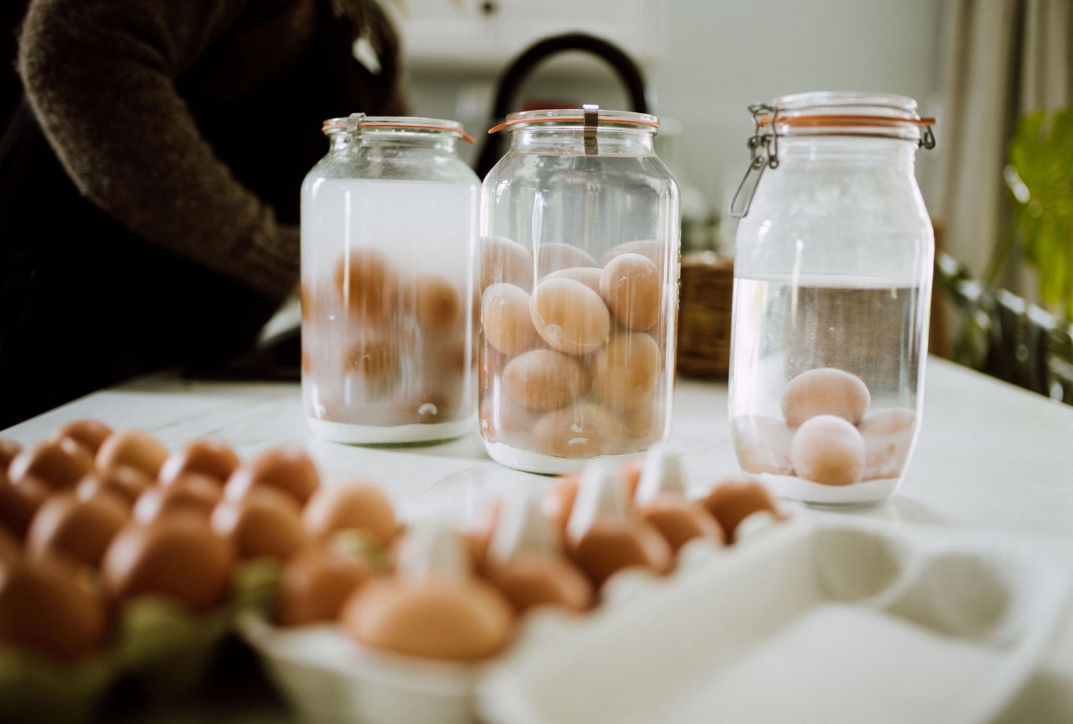Waterglassing eggs or slack eggs or lambing eggs. Whatever you call it, it's a relatively out-there way to preserve eggs that may put a few people off. The idea of keeping a jar of eggs on your shelf may seem odd, and well, odd I can do. This process involves suspending eggs in a lime solution, inhibiting air through the shell and therefore preserving the contents inside.
Verging on crazy chicken lady territory definitely comes with its benefits. We have been lucky to have an abundance of eggs from our layers and a few summers ago, I thought I would preserve some in anticipation of my girls not laying over winter. After hours on YouTube and reading some American Homesteading blog posts, this method jumped out at me as fairly straightforward and cost effective. I filled a Food Grade bucket halfway which was around 50 eggs and thought that would be enough to keep us going through winter. The joke was on me because they kept on laying and then I bought more chooks. So, my bucket of water-glassed eggs sat waiting for me in the pantry for a whole year before I used them!

I was hesitant to taste them initially – what if they were off? One morning, I was caught short for breakfast and knew that this was my opportunity to try them. I carefully rinsed the lime off and cracked them into a bowl. A good few sniffs to make sure it smelled okay, they went into the pan to scramble and you know what, they were delicious.
The consistency of the eggs are slightly more watery than a fresh one, but once gently mixed, the consistency is similar to a fresh whisked egg. It is worth noting that the longer they sit in the lime solution, the more watery the yolk is, and the shell will become more fragile. Caution is required when handling them.
For experiments sake, I also tried frying and then poaching with less success, that watery consistency didn’t lead to a successful cook. Baking? Perfect. Every time I bake my banana bread, I grab a few of my limed eggs for the recipe.
But why waterglass eggs? I'm a big believer in not putting all your eggs in one basket (zero apologies for the pun), but having more than one means in which you preserve your food is like an insurance if say, your freezer should turn off, or you knock a jar off the shelf.
I found plenty of American methods explaining the method and what equipment to use, I struggled to find the kiwi equivalent. This is what I did and how I did it.
Equipment for Waterglassing Eggs
- Kitchen gloves
- Mask
- Hydrated Lime
- Scales
- Large glass jar or food grade container
- Fresh farm eggs (unwashed and clean)
- Water
Housekeeping
You can purchase Food Grade hydrated lime off the internet, often imported from America, this product is designed for food preservation. However, I chose to use the hydrated lime from our local building supply store. We use this in our compost and in our garden beds, and now I have been using it for preserving eggs too. This building product is not designed for food preserving, as it is not as fine as the Food Grade product and not tested for food preserving. Use at your own caution.
Hydrated lime needs to be handled carefully: use gloves, a mask and do the mixing outside. You don’t want to be breathing in this stuff in a confined area. Same goes at the other end when you use your eggs, carefully clean them before using.
Method
- Get a Food Grade container. A glass jar is great because you can see in and see the condition of your eggs, otherwise look for buckets that specify they are Food Grade online or in catering supply stores.
-
Source your hydrated lime and choose a safe, well ventilated space to do this. I prefer out in the garden as the lime is safe to go on the ground if there are spills. Wear kitchen gloves and a mask when handling the lime.
- You need fresh, unwashed and clean eggs. Any eggs that are dirty, don’t preserve them. We need the eggs in their natural form, washing them can remove the outer layer (called bloom) and we need this layer to preserve them safely. This means you cannot preserve store bought eggs as they are washed, you either need your own hens or ask your chicken friend to keep some clean ones aside for you (I do this for neighbours!).
- Mix up one litre of water to 30g of lime and stir in your container to make a slurry. You can scale up or down from this measurement, depending on how much you need for your container. It is recommended to use unchlorinated water, if your water source is chlorinated, simply boil your water first and let it cool prior to mixing with lime.
- Place the eggs in the lime water solution. Make sure the eggs are always covered in the water mix and try to stack them narrow end down.
- You can add to this container as you go, making sure the eggs you add are clean and fresh. I like to have a strip of masking tape on each container so I know when I made each batch. Keep a lid on your container to prevent evaporation. If you notice the mixture is evaporating, dispose of any exposed eggs and top up with more of the solution. If you need more solution just mix up more using the same ratio.
It is important to wash the egg thoroughly when you take it out to use, I add these eggshells to the compost as the calcium from the shells and lime residue is a great addition for compost bins.
Waterglassed eggs are great for using in baking, or as I mentioned before, cooked scrambled. I reach for these eggs when baking predominantly, I still always have to do the sniff test… just incase.


